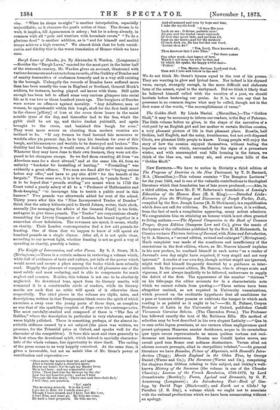The Knight of Intercession, and other Poems. By S. J.
Stone, M.A. (Rivingtons.)—There is a certain sadness in reviewing a volume which, while full of evidences of taste and culture, yet fails of the power which would assert and secure a place among the books which men actually read. Happily the pleasure of composition is of all pleasures one of the most subtle and most enduring, and is able to compensate for much neglect and censure. Besides, this volume is not one to be absolutely neglected. Its devotional tone, apart from its literary merits, will commend it to a considerable circle of readers, while its literary merits are such that no critic will speak of it otherwise than respectfully. The chief pieces in the volume are idylls, tales, and descriptions, written in that Tennysonian blank-verse the spirit of which exercises a sway over the young poets of these days, as complete as was that of the sparkling couplets of Pope over his contemporaries. The most carefully-studied and composed of these is "The Sea of Galilee," where the description in particular is very elaborate, and the verse highly polished. There is something, perhaps, of the almost in- evitable stiffness caused by a set subject (the piece was written, we presume, for the Triennial prize at Oxford, and speaks well for the character of the competition). It loses this most and rises generally to its best when the devotional spirit, which indeed is specially character- istic of the whole volume, has opportunity to show itself. The ending of the poem seems to us very happily conceived. At the same time, it gives a favourable, but not an unfair idea of Mr. Stone's power of versification and expression :—
"Once more thy waters bear me, and again
After a barren night a cheerless morn. Heavy my heart ; for though my Master lives,
He is not here and my remorseful soul
Cries, 'Thou hest lost thy Saviour by thy sin.'
Low lies my boastful pride : and as I hear Through the dim dawn, 'There cast and thou shalt find,' I will obey, not question. "Lo! again The morning miracle. It is the Lord !
I get me to Him, for I needs must go] - Though I have sinned, and I have lost His lore, I love Him, and must go. He bids me come, He With a feast prepared. He bids me eat, And all amazed and torn by hope and fear, I take the mystic food. ' " 0 then His eyes Look on me ; 0 divine, pathetic eyes!
All pity and the tender sweet reproach Of love that never fails and pardons all, Gaze on me there—and for the memory Of each dark sin, He has but this one word, `Lovest thou ME?
"Yes, Lord, Thou Imowest all ;
Thou kuowest that I love Thee." "Yet there comes
One other word—last legacy of love, Which I will keep for ever to that end Of which He spake, the happy awful end- " Yea, Master, Saviour, Lord and God, Thee vain love and follow to the end.'"
We do not think Mr. Stone's hymns equal to the rest of his poems. - They are wanting in glow and lyrical force. Nor indeed is his rhymed verse, except, strangely enough, in the more difficult and elaborate form of the sonnet, equal to the unrhymed. Did we think it likely that he believed himself called with the vocation of a poet, we should hesitate before bestowing our praise. As it is, we can say that he possesses in no common degree what may be called, though not in the first sense of the words, "the accomplishment of verse."


































 Previous page
Previous page